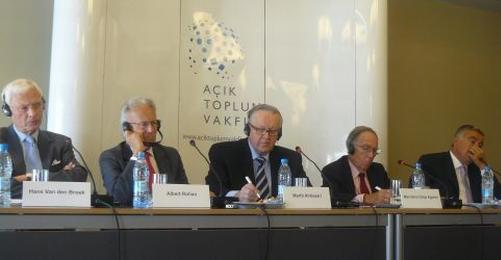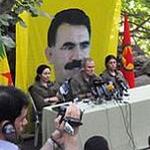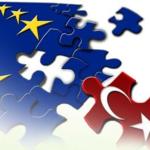The Independent Commission on Turkey held a press conference in the Istanbul Swiss Hotel on Saturday (18 September) after the Chair of the Commission, former President of Finland Martti Ahtissari, had held talks in the Kurdish-majority city of Diyarbakır and Turkey's capital Ankara.
The independent commission was formed "to examine the challenges and opportunities presented by Turkey's possible membership in the European Union. The Commission is made up of former heads of state and government, foreign ministers and European commissioners, and other Europeans who have previously held high positions in public office".The board is supported by the British Council in partnership with the Open Society Foundation. The commission appreciated the approval of the constitutional reform package in the referendum on 12 September and expressed their wishes for a positive outcome of the related implementations.
Nobel Peace Prize laureate Martti Ahtisaari is the chairman of the Commission. Albert Rohan, the former undersecretary of the Austrain Ministry of Foreign Affairs, is rapporteur, other members are the former Dutch Foreign Minister, Hans Van den Broek, and the former Spanish Foreign Minister, Marcelino Oreja Aguirre.
Questions adressed to the commission in the press conference mainly dealt with the Kurdish question, the ceasefire expected to expire on 20 September and "freedom of expressing thoughts".
Ahtissari: Everybody called for end of violence
Ahtissari said that he was mostly impressed by the message "to end violence" and the call that "politics should advance the process". This message, Ahtissari argued, was conveyed by everybody he talked to in Diyarbakır, a city in the pre-dominantly Kurdish region of south-eastern Turkey.
"We all inhere in optimism. I am 73 years old. Of course I want the ceasefire to be prolonged. Everything has to be done to create a good environment of negotiations. I have attended meetings where the supporters of their issues talked much tougher. Still, even if violence ends, some countries have a lot of other problems left".
Reminding the opportunity to resolve the conflict between the Aceh movement and the Indonesian Army, Ahtissari emphasized: "If you have stayed in the mountains for 30 years, you cannot fall in love with democracy over night. Everything has to be aimed at putting the weapons down".
Aguirre: Terrorism must be refused, all requests must be evaluated
Aguirre said that as a Basque he was familiar with the issues of regionalism and autonomy. "Terrorism must not be accepted, without exemptions. However, people should be able to make all sorts of requests regarding cultural and political rights. The right to education and publications in the mother tongue are legitimate requests. The methods of countries to provide these rights are varying. In Spain, there are 17 autonomous governments with their own constitutions and statutes", he propounded.
Broek: EU Membership difficult before Cyprus issue has not been solved
Broek, as a specialist on the Cyprus issue, indicated: "The negotiations between [the President of Southern Cyprus] Christofias and [Northern Cyprus President] Talat were sparking hopes, but right now it is different. The Free Trade Agreement was not implemented which utterly strains the EU relations and puts eight negotiation chapters on hold. The members of the European Union appreciate the reforms and Turkey's positive role in the region. Turkey might lose its status of membership candidate if the Cyprus question will not be resolved. Stronger efforts have to be taken in this issue".
When Broek was asked about his opinion on freedom of expression in Turkey, he re-directed the question to the journalists. After listening to them, Broek said he was curious about "how the amendments of the referendum package related to the higher judiciary would be reflected in reality".
Rohan: Discussions became freer
Rohan referred to formerly banned expressions such as "Kurd", "Kurdish people" and "Kurdish identity" when he said that he had witnessed an improvement in the discussion of sensitive matters such as the Kurdish question and relations to Armenia. He said that discussions became freer. "Steps towards the Kurdish people must be continued", Rohan said.
Ahtissari noticed that the Turkish government took the relations with the EU serious. "Preparations have been made on the chapters that have not been opened yet. There is a well-working mechanism. This will apply pressure on the EU in terms of opening new chapters". He added that he would come back to Turkey in February next year in a different mission. (EÖ/VK)













